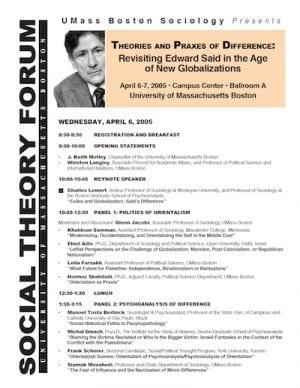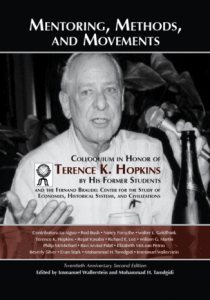Proceedings Journal Article — Edward Said: The Colonial Spirit in a Globalizing World — by Bruce Mazlish
$15.00
Edward Said’s accomplishments are legendary. He was a scholar of unsurpassable erudition, who used his scholarship to try and influence political change. He strove for intellectual impartiality, while infusing all his work with passion. He was at home in comparative literature and literary theory alike. His name will forever be linked with the notions of Orientalism and post-colonialism.
Description
Abstract
Edward Said’s accomplishments are legendary. He was a scholar of unsurpassable erudition, who used his scholarship to try and influence political change. He strove for intellectual impartiality, while infusing all his work with passion. He was at home in comparative literature and literary theory alike. His name will forever be linked with the notions of Orientalism and post-colonialism. Divided, so to speak, in his natal origins—a Christian Palestinian living most of his life in the USA—he constructed his identity as an exile and a cosmopolitan—a marginal man—who could see inside the culture of others. He will forever be an inspiration to anyone working on culture and imperialism, which he indissolubly linked. Though one can glimpse this linkage in his early work, he and it grew together in a deeper and more mature fashion as he moved toward the end of his life.
This essay is an inquiry into a few aspects of Said’s work that hopefully benefits from a tangential view of his work, perhaps illuminating some sides of him passed over by scholars more immersed in the details. A theory about the sociology ofknowledge, about the relations of culture and politics, about the nature of representation, and about the role of the intellectual, these surely are major contributions to social theory that Edward Said made. Just as clearly, they are not in the positive mode of much of modern-day sociology. But this is to say that such sociology is narrow; it must be made insistently complementary with the hermeneutic approach. While Said, to my knowledge, does not use that particular word, hermeneutics, such an approach is central to his achievements in social theory.
The way of Said staked out his position was to invoke the name of Vico frequently. The over-all result of Said’s hermeneutic, or should I say literary, inclinations, when added to his double consciousness, and his exilic awareness is a lasting gift to the world of social theory. I also honorSaid by viewing him critically, as he would have wished. My thesis is that Said came to the edge of a global world, but never truly transcendedthe colonial spirit that informed and inspired his work. His milieu was basically that of the anti-colonial movement, which spawned the nationalisms that he came to criticize so severely, necessary steps though they were, and which he wanted to go beyond to what he called liberation. Liberation for Said meant a transcending of local identities in the name of humanity. It is at this point that Said stood at the edge ofwhat we now characterize as globalization, and peered into that world, but did not enter fully into it, certainly not in the sense of trying to analyze it with the tools of social science.
Recommended Citation
Mazlish, Bruce. 2005. “Edward Said: The Colonial Spirit in a Globalizing World.” Pp. 19-26 in Theories and Praxes of Difference: Revisiting Edward Said in the Age of New Globalizations: Proceedings of the Second Annual Social Theory Forum, April 6-7, 2005 (Discourse of Sociological Practice, Vol. 7, Issues 1&2, Fall/Spring 2005). Double-Issue Guest Editor: Mohammad H. Tamdgidi. Sociology Department, UMass Boston.
Read the Above Publication Online
To read the above publication online, you need to be logged in as an OKCIR Library member with a valid access. In that case just click on the large PDF icon below to access the publication. Make sure you refresh your browser page after logging in.






